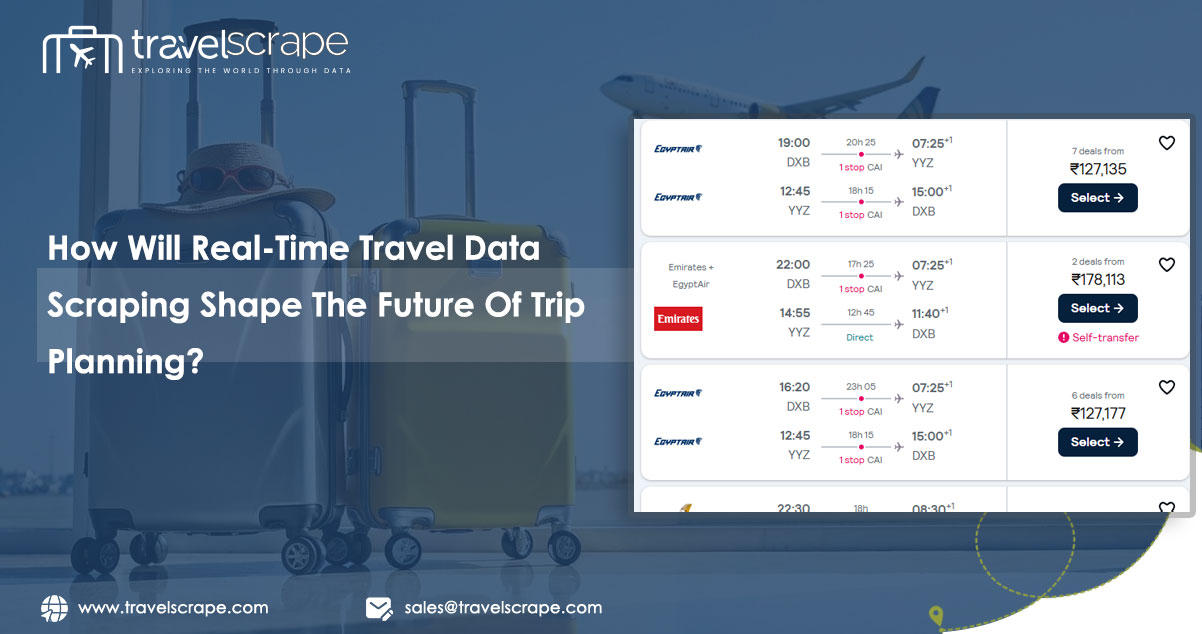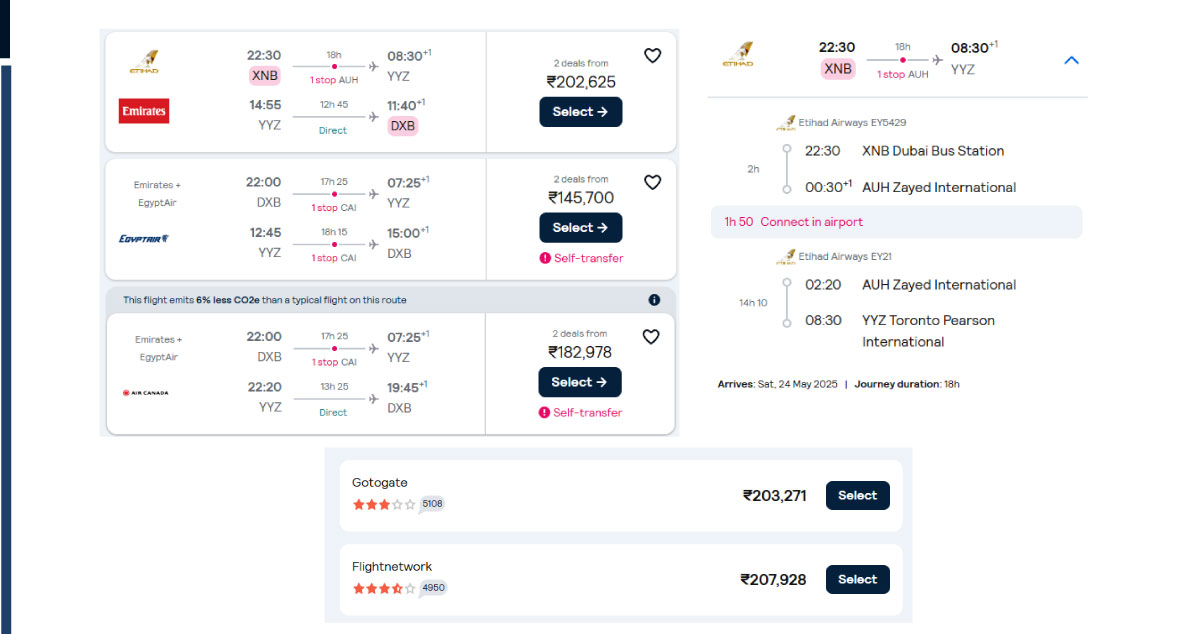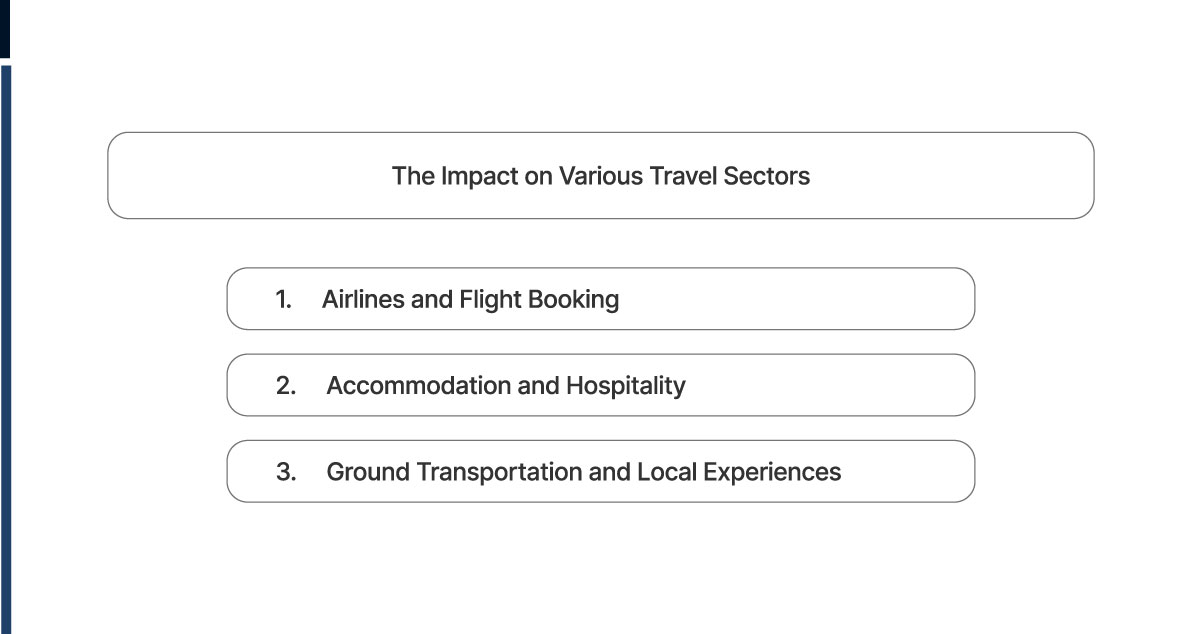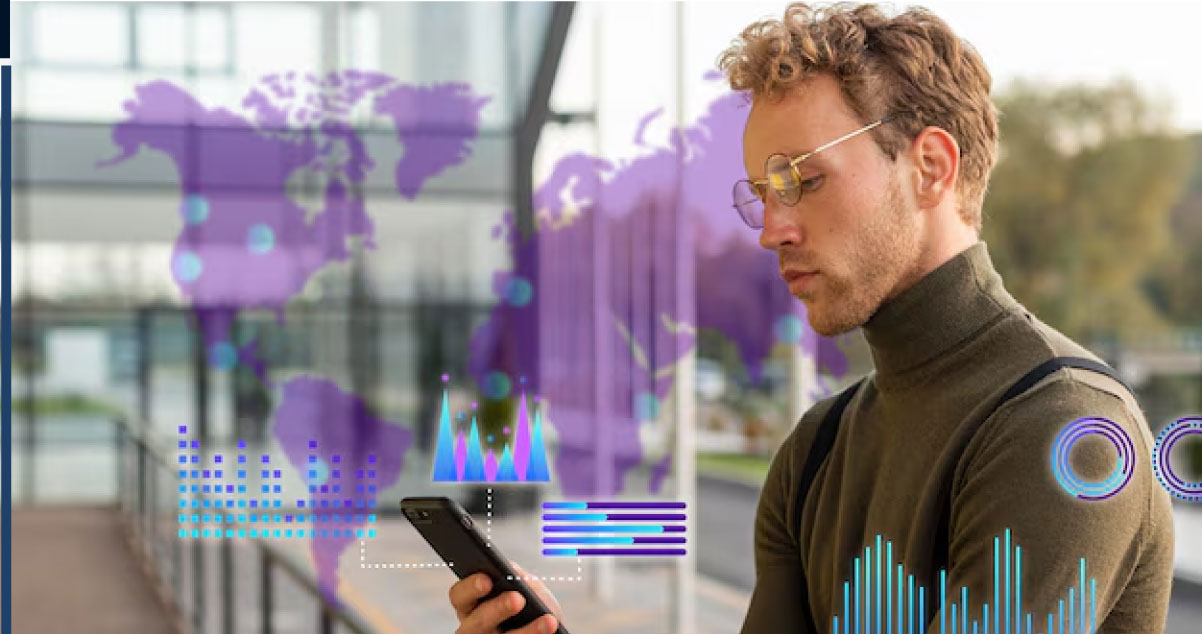How Will Real-Time Travel Data Scraping Shape The Future Of Trip Planning?

Introduction
Modern travelers expect more than convenience—they seek accuracy, immediacy, and personalized experiences at every journey stage. Traditional planning tools like outdated travel guides and static content no longer meet these evolving expectations.
This is where Real-Time Travel Data Scraping steps in, revolutionizing the travel landscape. Rather than simply gathering information, this approach captures and utilizes live, continuously updated data streams. From tracking real-time flight price fluctuations to monitoring instant weather disruptions, this dynamic data empowers travelers and industry stakeholders to make informed, adaptive decisions.
The Evolution of Trip Planning: From Static to Dynamic

Travel planning has undergone a remarkable transformation over the decades. What once involved physical maps, printed timetables, and telephone bookings has evolved into sophisticated digital ecosystems powered by vast amounts of data.
The transition from static to dynamic information represents the most significant shift in this evolution. Historical travel planning relied on information that might be days, weeks, or even months old. Today's travelers, however, operate in a world where Real-Time Travel Data offers instantaneous insights, allowing for more informed decisions.
Consider how drastically different the experience is now. Travelers can monitor price fluctuations throughout the day, receive immediate alerts about changing conditions, and adjust their plans accordingly—all enabled by sophisticated Travel Data APIs and integrated systems that process information continuously.
The growing demand for real-time insights has unlocked new dimensions in personalization across the travel industry. With the help of Travel Review Data Intelligence , each journey can now be precisely tailored to individual traveler preferences, constraints, and expectations, offering curated experiences that were nearly impossible to achieve just a decade ago.
How Does Real-Time Travel Data Scraping Work?
At its core, Dynamic Travel Data Scraping involves automated systems that continuously collect, process, and analyze information from countless travel-related sources across the Internet. These include airline websites, hotel booking platforms, review sites, social media channels, weather services, and more.
The technical process involves specialized software using various methods to extract structured data from web pages.
These might include:
- HTML parsing to identify and extract specific information.
- API connections that facilitate direct data exchange between systems.
- Machine learning algorithms that can recognize patterns even when website structures change.
- Proxies and rotating IP addresses to manage access limitations.
Once collected, this raw data undergoes sophisticated processing: normalization to ensure consistency across sources, filtering to remove irrelevant information, and enhancement through cross-referencing with additional datasets. The result is a comprehensive stream of accurate, up-to-date travel intelligence ready for application.
The Impact on Various Travel Sectors

The Impact on Various Travel Sectors refers to how real-time data collection and analysis are fundamentally transforming different segments of the travel industry. They are creating new operational efficiencies for businesses while simultaneously enhancing the traveler experience through more accurate, timely, and personalized services.
1. Airlines and Flight Booking
Perhaps nowhere is the impact of Real-Time Travel Data Scraping more evident than in air travel:
- Dynamic fare management: Airlines adjust prices sometimes hundreds of times daily based on real-time demand, competitor pricing, and remaining inventory.
- Proactive disruption management: Live Flight Tracking Data enables systems to predict delays and cancellations hours before official announcements, giving travelers crucial advance notice.
- Personalized fare alerts: Travelers receive notifications when prices drop on their monitoring routes, often with contextualized advice about booking immediately or waiting.
- Seat inventory optimization: Airlines maximize revenue by constantly recalibrating seat availability across different fare classes based on booking patterns.
2. Accommodation and Hospitality
The hospitality sector has similarly embraced Smart Travel Analytics to transform operations:
- Competitive rate positioning: Hotels continuously monitor competitor pricing and adjust their rates accordingly, sometimes multiple times daily during peak seasons.
- Dynamic packaging opportunities: Properties create real-time bundles and offers based on current occupancy projections and local events.
- Automated upselling: Systems leverage Real-Time Travel Data to identify perfect moments for room upgrades or additional service offerings.
- Predictive staffing: Properties adjust personnel levels based on anticipated guest volumes and needs, optimizing service quality and operational costs.
3. Ground Transportation and Local Experiences
Local services now operate with unprecedented responsiveness to current conditions:
- Surge pricing and incentives: Ride-sharing services and local transportation options adjust pricing based on real-time demand patterns.
- Attraction capacity management: Museums, parks, and venues modify entry procedures based on current visitor volumes to enhance experience quality.
- Emerging trend identification: Travel Review systems detect patterns in feedback that might indicate changing visitor preferences or emerging issues.
- Weather-responsive itinerary adjustments: Tour operators automatically suggest alternative activities when conditions affect planned experiences.
The Rise of Intelligent Travel Planning
The convergence of real-time data streams with artificial intelligence has given rise to Intelligent Travel Planning systems that go beyond simple information delivery. These platforms don't just present data, they interpret it, identifying patterns and making proactive recommendations based on complex interrelationships between different factors.
Modern planning tools might consider hundreds of variables simultaneously: your historical preferences, current location, budget constraints, weather forecasts, event calendars, crowd predictions, etc. The resulting recommendations are continuously refined as conditions change, creating truly adaptive itineraries.
This AI In Travel Planning revolution represents a fundamental shift from static itineraries to dynamic journeys that evolve organically as circumstances change. A flight delay no longer means anxiously wondering about missed connections; your entire downstream itinerary adjusts automatically, with alternative arrangements suggested before you even need to ask.
Challenges and Considerations
Despite its transformative potential, Real-Time Travel Data Scraping faces several significant challenges:
● Data Accuracy and Reliability
The value of real-time data depends entirely on its accuracy. Misinformation—even when unintentional—can lead to poor decisions and frustrating experiences. Verification mechanisms must balance thoroughness with speed to ensure accurate and timely information.
● Privacy and Ethical Concerns
Using traveler data in today’s digital travel landscape introduces critical privacy concerns. While personalized experiences offer tremendous value, they depend on ethically handling sensitive information. As businesses adopt Custom Travel Data Solutions, industry stakeholders must ensure clear, transparent practices around what traveler data is collected and how it’s utilized.
● Access and Equity Issues
As travel planning increasingly relies on sophisticated technology, there's a risk of creating a digital divide between those without access to these tools. Ensuring that Instant Travel Updates and personalized recommendations remain accessible to travelers across different socioeconomic backgrounds represents a vital industry challenge.
Future Trends in Travel Data Scraping

Looking ahead, several emerging developments promise to revolutionize further how Dynamic Travel Data Scraping shapes travel experiences:
● Enhanced Predictive Capabilities
The next generation of travel planning tools will move beyond reactive responses to genuinely predictive intelligence. These systems will accurately forecast everything from price fluctuations to crowd levels days or weeks in advance by analyzing vast historical datasets alongside real-time conditions.
This predictive capacity will transform how travelers approach planning, shifting from opportunistic bargain-hunting to strategic decision-making based on sophisticated probability models. Smart Travel Analytics will incorporate more diverse data sources, including social media sentiment, search patterns, and macroeconomic indicators.
● Voice and Natural Language Interfaces
As voice-activated assistants evolve, travelers will increasingly engage with planning platforms using natural, conversational language rather than structured search queries. These intelligent interfaces will interpret subtle preferences and contextual cues, offering tailored suggestions powered by Travel Data Intelligence instead of relying solely on direct input.
Imagine simply saying, "I need a weekend getaway next month somewhere warm but not crowded," and receiving tailored suggestions considering your past travel patterns, current constraints, and real-time destination intelligence.
● Hyperlocal and Contextual Awareness
Future systems will incorporate increasingly granular data about specific locations and contexts. Rather than generic information about a city or neighborhood, Instant Travel Updates will provide insights about particular blocks, buildings, or even specific rooms—all continuously updated as conditions change.
This hyperlocal awareness will also extend to temporal factors, with recommendations adjusting not just based on the day but the precise hour, accounting for factors like typical crowd patterns, lighting conditions for photography, or optimal times for specific experiences.
The Democratization of Premium Travel Experiences
The most exciting prospect of advanced Real-Time Travel Data Scraping is how it democratizes access to experiences once reserved for privileged travelers with insider knowledge or dedicated travel agents.
The average traveler now wields tools more powerful than those available to professional agents just a decade ago. They can identify optimal booking windows, receive alerts about limited opportunities, and access personalized recommendations previously possible only through expensive concierge services.
This democratization empowers travelers to explore destinations more authentically and efficiently, helping them optimize their time and resources while avoiding typical travel hassles. By leveraging tools like a Travel Scraping API, it also promotes more balanced travel flows, spreading tourist traffic across various times and places, which helps reduce the strain of overtourism on highly frequented spots.
How Travel Scrape Can Help You?
As the landscape of travel planning evolves, specialized services like ours have emerged to help businesses and individuals harness the power of Real-Time Travel Data. Our platform offers comprehensive solutions tailored to diverse needs across the travel ecosystem:
- Customized Data Collection: We design bespoke scraping solutions that precisely target the information sources most relevant to your business needs.
- Seamless Integration: Our Travel Scraping API connects directly with your existing systems, eliminating complicated technical hurdles.
- Advanced Analytics: We transform raw data into actionable insights through sophisticated Travel Data Intelligence tools that identify patterns and opportunities.
- Scalable Infrastructure: Whether you're an individual developer or a major enterprise, our solutions scale effortlessly to match your requirements.
- Compliance Expertise: Navigate the complex legal landscape of data collection confidently, knowing our methods adhere to best practices and regulatory requirements.
- Real-Time Alerting: Receive immediate notifications about changes relevant to your interests or concerns.
We specialize in creating Custom Travel Data Solutions that give businesses competitive advantages while helping travelers make better decisions. Our team of experts combines technical expertise with deep industry knowledge to deliver systems that drive measurable results.
Conclusion
As the travel landscape continues to evolve, Real-Time Travel Data Scraping is becoming the cornerstone of smarter, more dynamic decision-making. Gone are the days of one-size-fits-all itineraries—today’s travelers demand experiences that are as agile and personalized as the technologies that power them.
For businesses navigating this shift, the ability to harness insights from Travel Aggregators and broader digital ecosystems through advanced Travel Industry Web Scraping is no longer optional—it’s essential. From optimizing customer engagement to refining offerings in real time, data is the key to staying ahead.
Contact Travel Scrape to unlock the full potential of real-time intelligence. Whether enhancing user experiences, streamlining operations, or gaining a competitive edge, our tailored solutions help you lead confidently in a data-driven travel economy.